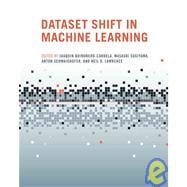
Note: Supplemental materials are not guaranteed with Rental or Used book purchases.
Purchase Benefits
Looking to rent a book? Rent Dataset Shift in Machine Learning [ISBN: 9780262170055] for the semester, quarter, and short term or search our site for other textbooks by Quinonero-candela, Joaquin; Sugiyama, Masashi; Schwaighofer, Anton; Lawrence, Neil D.. Renting a textbook can save you up to 90% from the cost of buying.
| Introduction to dataset shift | p. 1 |
| When training and test sets are different: characterizing learning transfer | p. 3 |
| Projection and projectability | p. 29 |
| Theoretical views on dataset and covariate shift | p. 39 |
| Binary classification under sample selection bias | p. 41 |
| On Bayesian transduction: implications for the covariate shift problem | p. 65 |
| On the training/test distributions gap: a data representation learning framework | p. 73 |
| Algorithms for covariate shift | p. 85 |
| Geometry of covariate shift with applications to active learning | p. 87 |
| A conditional expectation approach to model selection and active learning under covariate shift | p. 107 |
| Covariate shift by kernel mean matching | p. 131 |
| Discriminative learning under covariate shift with a single optimization problem | p. 161 |
| An adversarial view of covariate shift and a minimax approach | p. 179 |
| Discussion | p. 199 |
| Author comments | p. 201 |
| References | p. 207 |
| Notation and symbols | p. 219 |
| Contributors | p. 223 |
| Index | p. 227 |
| Table of Contents provided by Blackwell. All Rights Reserved. |
The New copy of this book will include any supplemental materials advertised. Please check the title of the book to determine if it should include any access cards, study guides, lab manuals, CDs, etc.
The Used, Rental and eBook copies of this book are not guaranteed to include any supplemental materials. Typically, only the book itself is included. This is true even if the title states it includes any access cards, study guides, lab manuals, CDs, etc.